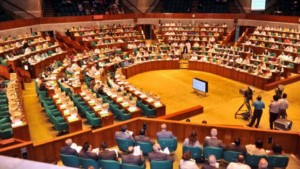Bangladesh’s gross domestic product (GDP) will be 7 percent in the current fiscal year (2017-’18) while 7.2 percent in the next fiscal as its economy looks to be in a very good shape, says the Asian Development Bank (ADB).
“The GDP growth is expected to be moderate 7.0 percent in FY 2018 as consumption demand slackens despite a rebound in worker remittance,” said
Asian Development Outlook-2018 revealed by the ADB here on Wednesday.
The flagship report of the ADB also said the inflation is projected to rise in FY 2017-‘18 to 6.1 percent from 5.4 percent in FY 2016-17 due to higher global prices for oil and other commodities, upward adjustments to natural gas and electricity prices and likely taka depreciation.
ADB country director Manmohan Parkash launched the report at a press conference at its office.
“Bangladesh’s economy appears to be in a good shape and likely to continue to grow. The GDP growth is expected to grow by 7.0 percent in FY 2018 with continued strong consumption and public investment,” he said.
Parkash also said export performance of the country is expected to strengthen, but net exports are not likely to add to growth due to expanding import. “On the supply side, industry growth is likely to pick up this year and be a main contributor to the stable growth.”
Mentioning that the country’s GDP growth rate rose to 7.3 percent in FY 2017, he said there is an always opportunity for further growth for which Bangladesh need to identify new drivers of growth.
“The contributions of exports and remittances –-two traditional growth drivers–seem to be weakened in recent years. Diversifying exports away from readymade garments and promoting labour intensive manufacturing would help expand industry and underpin continued high economic growth,” the ADB country director added.
He said Bangladesh needs to ensure balanced regional development to reduce concentration of economic activity in an around Dhaka and Chattogram.
Bangladesh has good potential in several industries such as leather and footwear, light engineering, electronics, pharmaceuticals, jute products and software and other information and communication technology products, Parkash observed.
“These industries could leverage the country’s large supply of low-cost labour and advantageous location to garner participation in global value chains and enter new markets,” he added.
Explaining the report, ADB economist Soon Chan Hong said Bangladesh’s economic outlook is broadly optimistic.
He, however, said for maintaining the sustainable high growth Bangladesh needs to expand its industrial base and diversify export basket.
Besides, the economist said Bangladesh should take proper steps and polices to improve business environment, reduce the cost of doing business, address the infrastructure and skill deficits, largely expand technical and managerial skills, reform tax system and improve the bank sector performance for its further economic development.
As his attention was drawn to 7.65 percent GDP growth projection in the current fiscal year by the Bangladesh Bureau of Statistics, Parkash said their estimate is based on data three months back while the BBS did it on the latest data.
He, however, said Bangladesh has been maintaining 7 percent growth for the last three consecutive years which indicates a robust economic development of the country. “We can debate over whether it is 7.1, 7.2 or 7.3 or 7.4 percent. The number difference is not the main issue. The main question can be whether the Bangladesh economy is well, and the simple answer it’s doing well and it’s expected to continue to do well.”
The ADB country director said Bangladesh has significantly reduced the poverty level and extreme poverty. ‘Bangladesh now needs more policies to improve its human capital and their skill development for getting success further in reducing poverty.”
He also said the skill development is an effective way to bring the poorest of the poor into the mainstream. “It’s very crucial for reducing poverty.”
Airing hope that the election will be held in the country this year in a peaceful manner, Parkash said the continuation of policy and political stability are the important factors to get higher growth.
About the disorder in banking sector here, he said the country needs a mechanism to have a proper credit risk assessment system and follow the international banking practices alongside good governance in bank management to overcome it. “The private sector should make efforts and play a key role in this regard.”
He congratulated Bangladesh on attaining the eligibility for the graduation from the least development country status and said the LDC graduation will open up new opportunities like access to resources from the international capital markets and larger inflows of foreign direct investment.




